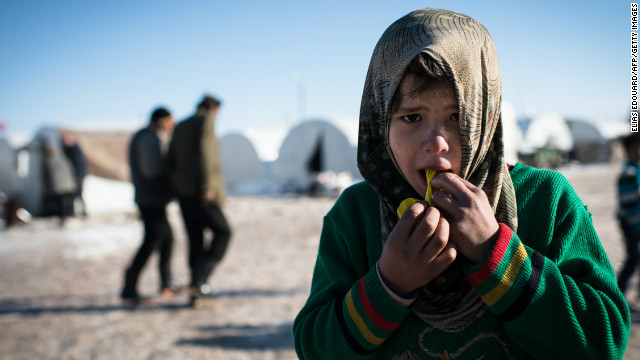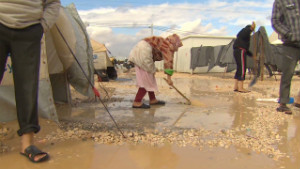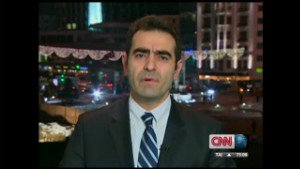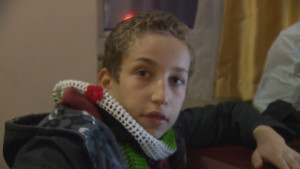U.N. agencies: Stop the suffering in Syria
January 11, 2013 -- Updated 1020 GMT (1820 HKT)

Syria's scarred children
STORY HIGHLIGHTS
- Four million people inside Syria are in desperate need of help
- More than half a million others have fled to neighboring countries
- U.N. agencies say they struggle to get aid to some areas inside Syria
- U.N.: "Living conditions in all areas of the country are deteriorating rapidly"
Editor's note: Three of
the United Nations' most senior executives have written a joint opinion
piece exclusively for CNN.com. They are Antonio Guterres, the U.N. High Commissioner for Refugees; Ertharin Cousin, the executive director of the World Food Program; and Anthony Lake, executive director of the U.N. Children's Fund or UNICEF.
(CNN) -- Of all the terrible conflicts facing the world in 2013, Syria is undoubtedly the most complex and dangerous.
Violence has left four
million people inside Syria in desperate need of help -- shelter, food,
education, clean water, health care and protection -- and has uprooted
two million inside the country and sent 600,000 fleeing the horrors of
war into neighboring countries. Now a bitter winter is the new enemy.
Syria's children suffer
the most. At least half of all those affected by the conflict are
children. Too many have been injured or killed; too many have seen
family and friends die, their homes and schools reduced to rubble.
The good news is our aid
is reaching approximately 1.5 million Syrians, even in areas of fighting
-- children are being vaccinated, and temporary schools are being set
up, families are being fed and sheltered -- thanks to our work and to
the valiant, efforts of many partners like the Syrian Arab Red Crescent.
 Syrian refugees live in cold, wind, rain
Syrian refugees live in cold, wind, rain
 Turkey: Syrian refugees streaming in
Turkey: Syrian refugees streaming in
 Refugee: When the phone rings, I worry
Refugee: When the phone rings, I worry
But we could do so much
more. There are areas inside Syria where our ability to deliver is
intermittent at best; where we cannot reach those in need of our help.
We appeal to all the parties involved in the conflict to grant
unrestricted humanitarian access inside Syria. Sadly, if this appeal
continues to go unheeded, we fear the already horrific level of
suffering will become even worse.
With each passing day,
and each passing week it becomes harder for Syrians to endure. Most
cannot flee and find safe havens in neighboring countries. Some find
precarious refuge with friends or the kindness of strangers in another
town. Others shelter in abandoned, unheated buildings or makeshift
camps. Many find themselves moving from one place to another, again and
again as the conflict spreads.
Living conditions in all
areas of the country are deteriorating rapidly. It is not only the
violence that people fear, but the combined threat of hunger, cold and
illness.
Neighboring countries
have opened their borders to 600,000 Syrian refugees and, with the help
of humanitarian organizations like ours, offer basic support for their
survival. But even they face difficult challenges.
Most refugees are
children who have escaped with mothers and grandmothers. Now, many have
been refugees for 21 months. It has been UNHCR's job to register them
and provide them with shelter and basic relief items like mattresses,
blankets and kitchen sets.
What is needed now is support from the entire international
community to asylum countries and organizations like ours to help us do
more
U.N. agencies
U.N. agencies
In most places, WFP
vouchers allow them to buy fresh food from the market. UNICEF helps
children overcome their trauma, gets them into schools, and gives them
with books and supplies and access to better health. Host communities
open their homes and their hearts. Host governments provide medical and
other community services.
As the numbers of refugees grow, so does the strain on these host governments.
The resources provided by Lebanon, Jordan, Turkey and Iraq are dangerously stretched.
No one can predict how
long this will last. What is needed now is support from the entire
international community to asylum countries and organizations like ours
to help us do more.
In December, the U.N.
appealed for $1.5 billion for the humanitarian response both inside and
outside Syria and we are urging donors to contribute more.
If the conflict can't be stopped now, the least we can do is ease the suffering.

ไม่มีความคิดเห็น:
แสดงความคิดเห็น